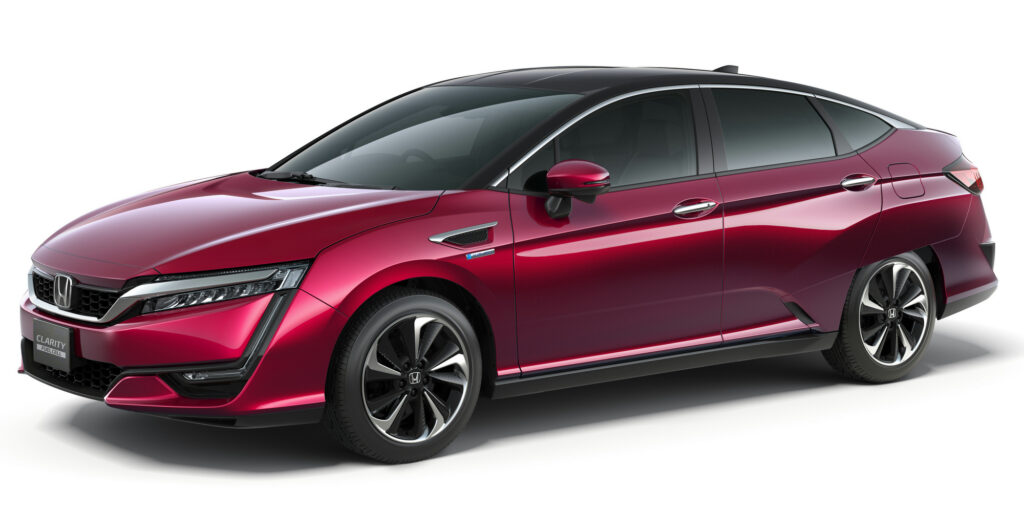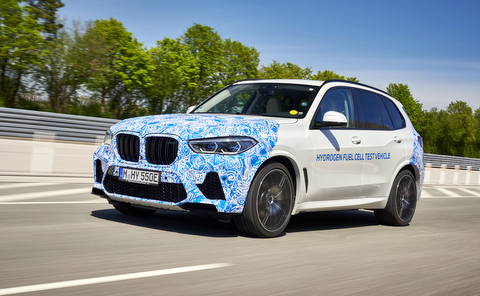Honda Drops Clarity FCEV; BMW & Land Rover Test Prototypes
Story by Michael Coates; photos from manufacturers or Clean Fleet Report archives.
It’s been a confusing week for hydrogen fuel cell vehicles. Depending on the story you read, one might assume the market for light-duty FCEVs is either dying or booming. Just during the past week Honda, one of the pioneers and stalwarts of the fuel cell market, announced it is discontinuing the low-volume Clarity, which is only sold in California. In the first five months of the year, Honda had only leased less than a thousand cars.

With Honda’s exit that leaves two fuel cell models on the market–the leading Toyota Mirai sedan, which just received a complete redesign, and the Hyundai Nexo compact crossover, which is still counting its sales in the hundreds. Both Toyota and Hyundai appear not only committed to their light-duty models, but are exploring the use of fuel cell technology for heavy-duty trucks. Honda’s statement about the end of Clarity Fuel Cell production (they also killed the Clarity Plug-in Hybrid after ceasing production of the Clarity Electric last year said that the company remained committed to fuel cell as well as battery electric zero-emission vehicles, but indicated future development would be part of “joint manufacturing and development agreements.” Honda’s signed up with General Motors to cooperate of future ZEVs as well as fuel cell technology and will have volume production of battery electric cars from that joint venture on the market in 2024.
BMW & JLR Jump on Board
The attitude in Europe about fuel cells paints a contrasting picture. Both BMW and Jaguar Land Rover announced this week advanced testing of hydrogen fuel cell models that could appear on the market in a few years.
BMW has a history with hydrogen; early on (2005-07) it produced a limited series of its 7-Series models with a massive 12-cylinder designed to run on either gasoline or hydrogen. Running on hydrogen, the cars produced zero tailpipe emissions, the same as a fuel cell car, but the car was designed to be filled with liquid hydrogen, which is much more difficult to handle than the compressed hydrogen typically used by fuel cell models. While BMW said the Hydrogen 7 was “production-ready,” it never made it past limited volume production.

This time around BMW is using fuel cell technology, which aligns it with other players in the market. The company showed the i Hydrogen Next SUV at the 2019 Frankfort Motor Show, but testing continuing with a small fleet of 5-Series based fuel cells. Last week BMW announced it was beginning “everyday testing” of a “near-standard” version of the i Hydrogen Next that will launch next year (2022) in an X5 based model.
The fuel cells for the BMW SUV come from joint development work with Toyota. The individual cells came from Toyota while the fuel cell stack and drive system are BMW technology. The companies have been working together since 2013 on fuel cell technology.
BMW combines the fuel stack with its fifth generation eDrive technology (already on the market in the BMW iX3 battery electric SUV). The end result is 125 kilowatt (kW or 170 horsepower), which combines with a battery buffer that adds power to boosts the system to 275 kW (374 hp). That combined number just happens to equal the output of BMW’s most powerful six-cylinder engine, guaranteeing comparable performance.
The BMW i Hydrogen Next feeds its battery storage through regenerative braking while the hydrogen comes from two 700-bar (10,000 psi) tanks that hold a total of six kilograms of hydrogen.
Land Rover’s Fuel Cell Approach
Jaguar Land Rover (JLR) announced this past week it has started testing Defender fuel cell prototype. It worked with partners AVL and Marelli Automotive Systems to develop the prototype, based on the company’s gas/diesel Defender model, using funds from a $12.3 million UK government grant.
For several years JLR has said it would explore fuel cell technology as an alternative to battery-electric powertrains for its heavy SUVs. The company has pledged to market only zero tailpipe emissions vehicles by 2036. For bigger vehicles, hydrogen’s longer range and faster fueling time give it an advantage compared to battery electrics.
“Hydrogen offers another zero-tailpipe-emissions solution for the specific capabilities and requirements of Jaguar Land Rover’s lineup,” Ralph Clague, JLR’s head of hydrogen and fuel cells, said in a statement. The company has not announced production plans or a timeline for the introduction of a fuel cell model.
It appears automotive fuel cell technology is taking one step back and two steps forward, as it struggles to maintain a place in the worldwide race to zero emissions vehicles. Like battery electric vehicles (BEVs), it faces the challenge of creating a new infrastructure, but unlike BEVs, it can more closely replicate consumers current gas/diesel fueling experience in time and ease of use.

2 thoughts on “News: Hydrogen Fuel Cell Market Confused”